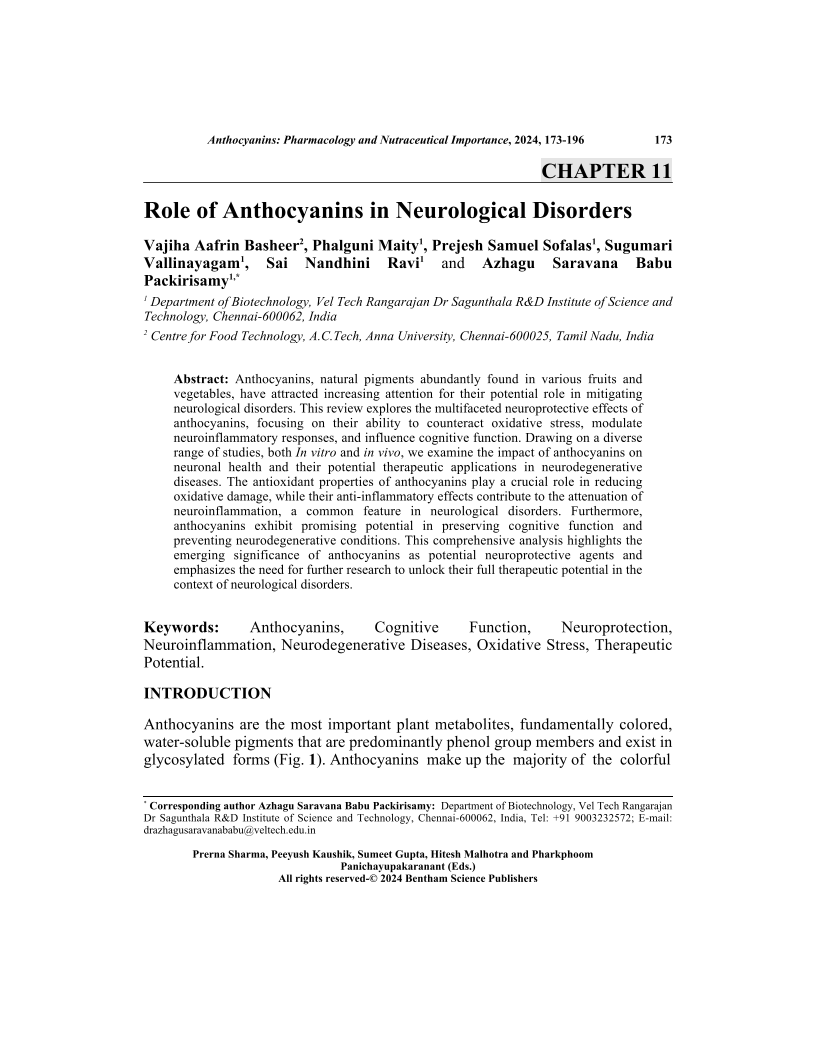Role of Anthocyanins in Neurological Disorders

- Authors: Vajiha Aafrin Basheer1, Phalguni Maity2, Prejesh Samuel Sofalas3, Sugumari Vallinayagam4, Sai Nandhini Ravi5, Azhagu Saravana Babu Packirisamy6
-
View Affiliations Hide Affiliations1 Centre for Food Technology, A.C.Tech, Anna University, Chennai 600025, Tamil Nadu, India 2 Department of Biotechnology, Vel Tech Rangarajan Dr Sagunthala R&D Institute of Science and Technology, Chennai-600062, India 3 Department of Biotechnology, Vel Tech Rangarajan Dr Sagunthala R&D Institute of Science and Technology, Chennai-600062, India 4 Department of Biotechnology, Vel Tech Rangarajan Dr Sagunthala R&D Institute of Science and Technology, Chennai-600062, India 5 Department of Biotechnology, Vel Tech Rangarajan Dr Sagunthala R&D Institute of Science and Technology, Chennai-600062, India 6 Department of Biotechnology, Vel Tech Rangarajan Dr Sagunthala R&D Institute of Science and Technology, Chennai-600062, India
- Source: Anthocyanins: Pharmacology and Nutraceutical Importance , pp 173-196
- Publication Date: November 2024
- Language: English
Role of Anthocyanins in Neurological Disorders, Page 1 of 1
< Previous page | Next page > /docserver/preview/fulltext/9789815223880/chapter-11-1.gif
Anthocyanins, natural pigments abundantly found in various fruits and vegetables, have attracted increasing attention for their potential role in mitigating neurological disorders. This review explores the multifaceted neuroprotective effects of anthocyanins, focusing on their ability to counteract oxidative stress, modulate neuroinflammatory responses, and influence cognitive function. Drawing on a diverse range of studies, both In vitro and in vivo, we examine the impact of anthocyanins on neuronal health and their potential therapeutic applications in neurodegenerative diseases. The antioxidant properties of anthocyanins play a crucial role in reducing oxidative damage, while their anti-inflammatory effects contribute to the attenuation of neuroinflammation, a common feature in neurological disorders. Furthermore, anthocyanins exhibit promising potential in preserving cognitive function and preventing neurodegenerative conditions. This comprehensive analysis highlights the emerging significance of anthocyanins as potential neuroprotective agents and emphasizes the need for further research to unlock their full therapeutic potential in the context of neurological disorders.
-
From This Site
/content/books/9789815223880.chapter-11dcterms_subject,pub_keyword-contentType:Journal -contentType:Figure -contentType:Table -contentType:SupplementaryData105

